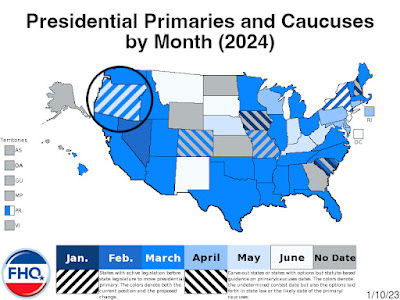"James Skoufis, a New York state senator who previously ran for Democratic National Committee chair, told CNN he will introduce a bill Thursday to move the Empire State’s 2028 presidential primary to Super Tuesday, traditionally the first time a large batch of states votes on the same day and often the day that presidential front-runners separate themselves from the also-rans.
"Skoufis has already lined up what he believes will grow into enough support to pass. His proposal has the potential to reshape the next White House race for Democrats, who would need to put together larger-scale campaigns early, given the size and diversity of New York’s electorate and the expense of the state’s media markets."
...
Noteworthy: The New York primary was a Super Tuesday regular from 2000-2008, even moving up to the at-the-time new February Super Tuesday for 2008. When both parties restricted February primaries for 2012, New York legislators moved to the current protocol they have used in every cycle since. Basically that has entailed leaving the primary in February until June-ish of the year prior to a presidential election at which time the legislature (in coordination with both state parties) sets the date and the delegate allocation rules for the cycle. The date of the primary then reverts to February at the end of the presidential election year and the process starts all over again.
Skoufis' proposed legislation would break from that established post-2008 protocol.
--














